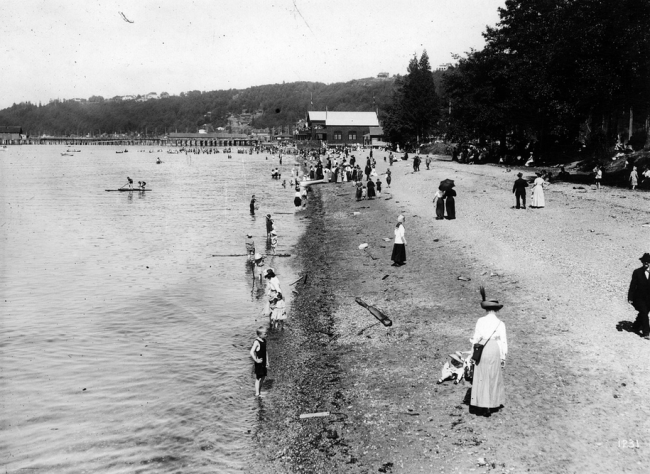When Alki Beach opened in 1911, was it as progressive as New York?
Alki Beach in 1911
Mon, 01/19/2015
By Rob Ketcherside
There's a story waiting to be told here, about racism.
Alki Beach opened on July 4th, 1911. You probably know that Alki means "by and by" or "before long", and that Seattle's first name was New York Alki. The first ship of pioneer settlers were both aspirational and willing to make fun of themselves. They joked to each other that the tents would be transformed into a new New York before long.
I opened up the digitized Seattle Times for the day before Alki opened. At the top of the page, above the Alki article, was a political cartoon. On the left, a big strong white man looks down on a tiny, scrawny black man with the caption "One Year Ago Today". On the right, that scrawny black man is now huge but still boney and goofy and with lips half the size of his head; the white man is miniscule but muscular, and the caption says "Today". It was a commentary on the one-year anniversary of Jack Johnson's defeat of James Jeffries. If you don't know what that means, do yourself a favor and look it up.
Alki was built in the image of New York City's public beach on Coney Island which was "following the trend of paternalism of municipal governments." Coney Island had bathing suits for rent, but the poor couldn't afford them so kids went into the water with "sawed off pants." And conservative immigrants couldn't bear to bare skin, so they went in with their clothes on, and changed into another pair. Most important to my point, though, was the purposeful, multiethnic, multiracial nature of the beach. The mayor of New York was quoted saying, "Everybody was having the time of his life. There were no racial lines."
I haven't found any comments about the mix of patrons at the beach in West Seattle. I do know that a week before the beach opened, the Holy Rosary Catholic Church in West Seattle invited the Tulalip tribe to visit Alki and bake some clams for the church picnic. That's the closest I've come, though.
The story is still waiting. Was Seattle as progressive as New York? Or were we still backwards, longing to be like New York, Al-ki?
(Coney Island article in Seattle Times 8/24/1911, page 15.)



